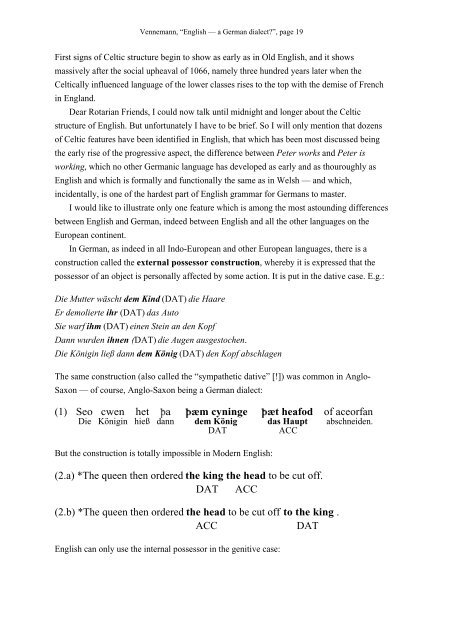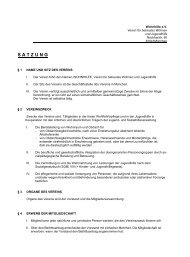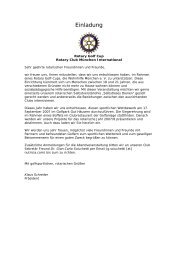English - a German dialect? - Rotary Club of Munich International
English - a German dialect? - Rotary Club of Munich International
English - a German dialect? - Rotary Club of Munich International
Create successful ePaper yourself
Turn your PDF publications into a flip-book with our unique Google optimized e-Paper software.
Vennemann, “<strong>English</strong> — a <strong>German</strong> <strong>dialect</strong>?”, page 19<br />
First signs <strong>of</strong> Celtic structure begin to show as early as in Old <strong>English</strong>, and it shows<br />
massively after the social upheaval <strong>of</strong> 1066, namely three hundred years later when the<br />
Celtically influenced language <strong>of</strong> the lower classes rises to the top with the demise <strong>of</strong> French<br />
in England.<br />
Dear Rotarian Friends, I could now talk until midnight and longer about the Celtic<br />
structure <strong>of</strong> <strong>English</strong>. But unfortunately I have to be brief. So I will only mention that dozens<br />
<strong>of</strong> Celtic features have been identified in <strong>English</strong>, that which has been most discussed being<br />
the early rise <strong>of</strong> the progressive aspect, the difference between Peter works and Peter is<br />
working, which no other <strong>German</strong>ic language has developed as early and as thouroughly as<br />
<strong>English</strong> and which is formally and functionally the same as in Welsh — and which,<br />
incidentally, is one <strong>of</strong> the hardest part <strong>of</strong> <strong>English</strong> grammar for <strong>German</strong>s to master.<br />
I would like to illustrate only one feature which is among the most astounding differences<br />
between <strong>English</strong> and <strong>German</strong>, indeed between <strong>English</strong> and all the other languages on the<br />
European continent.<br />
In <strong>German</strong>, as indeed in all Indo-European and other European languages, there is a<br />
construction called the external possessor construction, whereby it is expressed that the<br />
possessor <strong>of</strong> an object is personally affected by some action. It is put in the dative case. E.g.:<br />
Die Mutter wäscht dem Kind (DAT) die Haare<br />
Er demolierte ihr (DAT) das Auto<br />
Sie warf ihm (DAT) einen Stein an den Kopf<br />
Dann wurden ihnen (DAT) die Augen ausgestochen.<br />
Die Königin ließ dann dem König (DAT) den Kopf abschlagen<br />
The same construction (also called the “sympathetic dative” [!]) was common in Anglo-<br />
Saxon — <strong>of</strong> course, Anglo-Saxon being a <strong>German</strong> <strong>dialect</strong>:<br />
(1) Seo cwen het a æm cyninge æt heafod <strong>of</strong> aceorfan<br />
Die Königin hieß dann dem König das Haupt abschneiden.<br />
DAT ACC<br />
But the construction is totally impossible in Modern <strong>English</strong>:<br />
(2.a) *The queen then ordered the king the head to be cut <strong>of</strong>f.<br />
DAT ACC<br />
(2.b) *The queen then ordered the head to be cut <strong>of</strong>f to the king .<br />
ACC DAT<br />
<strong>English</strong> can only use the internal possessor in the genitive case:






